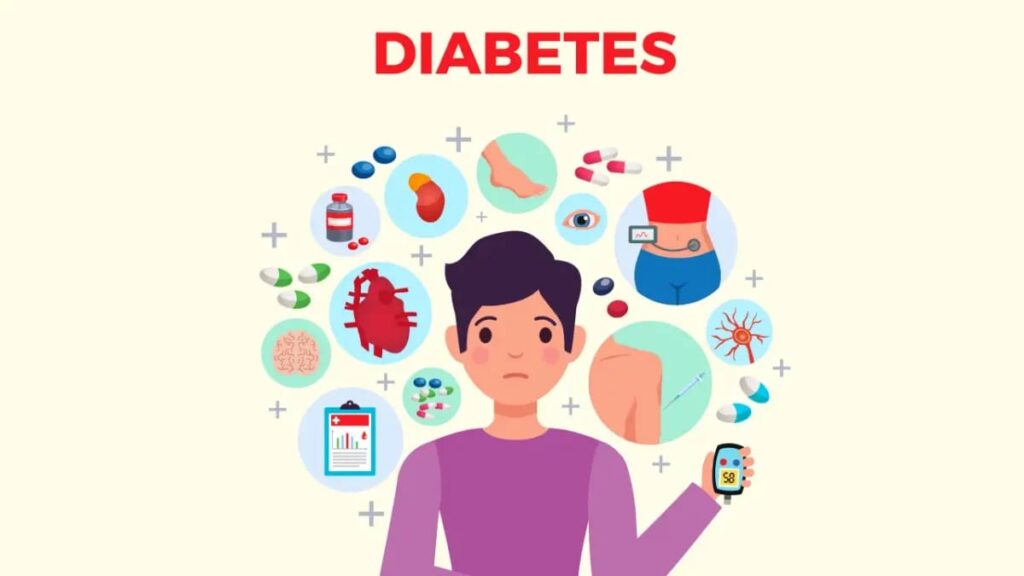

Introduction:
Diabetes is a chronic condition that affects millions of people worldwide. It’s a complex metabolic disorder that can lead to serious health complications if not managed properly. In this blog, we’ll dive into the world of diabetes, exploring its causes, symptoms, and effective management strategies.
What is Diabetes?
Diabetes, often referred to as diabetes mellitus, is a group of diseases characterized by high levels of blood glucose (sugar). This occurs when the body either doesn’t produce enough insulin (a hormone that regulates blood sugar) or doesn’t use it effectively. There are three primary types of diabetes: Type 1, Type 2, and gestational diabetes.
- Type 1 Diabetes:
Type 1 diabetes is an autoimmune condition in which the immune system mistakenly attacks and destroys the insulin-producing cells in the pancreas. This type usually develops during childhood or adolescence and requires lifelong insulin therapy. - Type 2 Diabetes:
Type 2 diabetes is more common and typically develops in adulthood, although it can occur at any age. It’s often associated with factors like obesity, genetics, and lifestyle choices. People with Type 2 diabetes may produce insulin, but their bodies don’t use it effectively. - Gestational Diabetes:
Gestational diabetes occurs during pregnancy when the body cannot produce enough insulin to meet the increased needs, leading to elevated blood sugar levels. It usually resolves after childbirth but can increase the risk of Type 2 diabetes later in life.
Symptoms of Diabetes:
Recognizing the early signs of diabetes is crucial for early diagnosis and effective management. Common symptoms include:
- Increased thirst and hunger
- Frequent urination
- Fatigue
- Unexplained weight loss
- Blurred vision
- Slow-healing wounds
- Tingling or numbness in the hands and feet

Managing Diabetes:
While there is no cure for diabetes, it can be effectively managed through lifestyle changes, medication, and regular monitoring. Here are some key strategies for managing diabetes:
- Healthy Eating:
Adopt a balanced diet that includes plenty of fruits, vegetables, lean proteins, whole grains, and healthy fats. Monitor carbohydrate intake to control blood sugar levels. - Regular Exercise:
Physical activity helps lower blood sugar levels and improves insulin sensitivity. Aim for at least 150 minutes of moderate-intensity exercise per week. - Medications:
People with Type 1 diabetes require insulin injections, while those with Type 2 diabetes may need oral medications, insulin, or a combination of both. - Blood Sugar Monitoring:
Frequent blood sugar monitoring is essential to track how your body responds to food, exercise, and medications. It helps you make necessary adjustments. - Stress Management:
Chronic stress can affect blood sugar levels. Incorporate stress-reduction techniques like meditation, deep breathing, or yoga into your routine.

Conclusion:
Diabetes is a manageable condition that requires consistent effort and self-care. By understanding the causes, recognizing symptoms, and implementing effective management strategies, individuals with diabetes can lead healthy, fulfilling lives. It’s essential to work closely with healthcare professionals to develop a personalized diabetes management plan that meets your unique needs. With the right tools and support, diabetes doesn’t have to stand in the way of a happy and healthy future.

VISIT OUR OFFICE : 5TH FLOOR LE-DESIRE COMPLEX, CIRCULAR ROAD ,LALPUR, RANCHI, JHARKHAND
VISIT OUR WEBSITE FOR MORE INFOMATION https://eternalcareerclasses.com
FOR TEST SERISE, PREVIOUS YEAR QUESTION PAPER OF NEET AND DPP FROM ALL CHAPTERS ARE AVAILABLE ON ETERNAL RANCHI APP.DIRECT DOWNLOAD FROM QR CODE GIVEN BELOW
